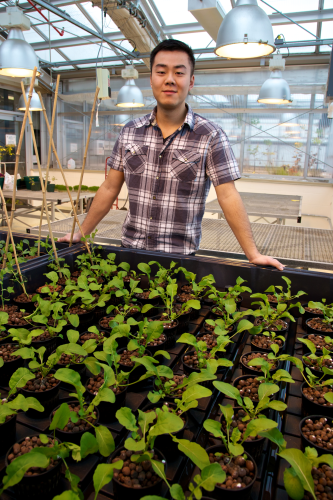Mar 28, 2013
Urban campus, urban agriculture at DePaul University
Urban campus, urban agriculture at DePaul University
The local food movement has been gaining steam for some
time, and DePaul graduate student Steve Lu aims to make Chicago a shining example
of sustainable, local food production.
Lu, an MBA candidate and greenhouse manager for DePaul’s
Environmental Science and Studies Department in the College of Science and Health, has recently
established an urban hydroponics system in the greenhouse at DePaul’s McGowan
South building where he tests conditions that will allow for the most
efficient, yet effective hydroponics farming.
“Steve’s experiments are aimed at finding the most efficient
hydroponic setup for growing hydroponic crops,” said Judith Bramble, chair of
the Environmental Studies department. “I think it’s a terrific goal, and we’ve
given him access to the greenhouse and additional space to allow him to develop
his concept.”
Chicago’s broken food
model
Through his experiments, Lu hopes to move more city dwellers
to a sustainable source of agriculture. This is important not only to large
cities like Chicago but to DePaul as well.
“I think it’s especially important to DePaul because we
pride ourselves on giving students an urban education,” Lu said. Lu stresses the importance of making fresh,
locally grown food available to everybody, a concept he refers to as food
sovereignty.
He noted that much of the food Chicagoans eat comes from
California, Mexico or Florida. “People
are realizing that getting our food from thousands of miles away is an unsustainable model, both logistically and environmentally.”
“I’m in agreement that it’s not sustainable,” Bramble
added. “It’s extremely costly in terms
of energy, and any time we use energy we contribute to the environmental
problems associated with the use of fossil fuels. It’s unnecessary in the United States. From the statistics I have seen, we spend a
smaller portion of our income on food than we ever have in the past. We expect
our food to be cheap, but I don’t know if that’s what is best for society.”
“Since you are growing indoors, from a financial perspective, the cost of electricity is going to be your single biggest operational expense,” he said. There are
several ways to save on energy costs, but if you’re not getting yield, you’re
not really being efficient.”
A facelift for the
Rust Belt
Lu notes that cities in the Rust Belt have redefined
themselves over the years. Urban centers like Chicago, Detroit and Cleveland
used to be great industrial cities. As
technology has progressed they have evolved into creative centers and jobs have
migrated from blue-collar to white-collar.
““As a result, you have all these huge manufacturing and industrial facilities that are being under-utilized,” Lu said. “One idea is to turn those spaces into agriculture centers. I know Chicago is on the forefront of this movement, and there is an idea being proposed to turn a South Side neighborhood into one of the country’s biggest urban agriculture centers.”
Ultimately, Lu hopes to turn vacant manufacturing areas into
thriving urban gardens and to expand hydroponic farming across the city.
“We’ve had an increase in the number of students interested
in urban agriculture over the last few years,” Bramble said. “Steve is just
amazing, and to the extent that we can help him with his career, I think it
will benefit everybody.

DePaul graduate student Steve Lu is advancing the study of urban hydroponics farming. (Photo by Jeff Carrion)
